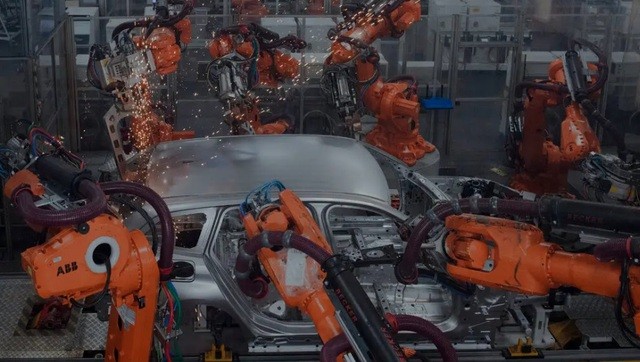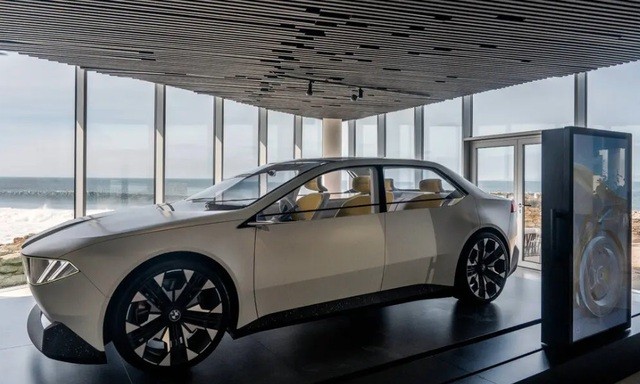BMW’s Surprising Success in the Electric Vehicle Market
When BMW’s cars roll off the assembly line, it’s hard to tell whether they will be powered by gas, electric, or a combination of both. This approach has been criticized by experts in the past, who saw it as a compromise and less efficient compared to other car manufacturers that focus solely on electric vehicles. However, BMW’s strategy has paid off and the company has emerged as a star in the electric vehicle market.
BMW’s Unique Approach
BMW produces its electric vehicles on the same assembly line as its gasoline-powered cars. The exterior design of the electric and gasoline cars is also similar. This approach includes using the same basic frame for electric, hybrid, gasoline, and diesel vehicles. While some experts view this as a compromise, BMW has proven them wrong.
Impressive Sales Figures
In the past year alone, BMW sold 376,000 electric vehicles, representing a 75% increase compared to the previous year. In the luxury segment, BMW is second only to Tesla, selling a total of 1.8 million vehicles. Electric vehicles accounted for 15% of BMW’s sales in 2023, up from 9% the previous year.
BMW’s Growth in a Slow-Growing Market
BMW’s growth is even more impressive considering the slower growth rate of the global electric vehicle market. What’s surprising is that, unlike General Motors and Ford Motor, BMW has managed to generate profits from its electric vehicles.

BMW’s Experience Paves the Way
BMW’s success offers hope for other long-established car manufacturers as newer players like Tesla and Chinese electric vehicle manufacturers gain traction. The familiarity and craftsmanship associated with established car manufacturers have garnered the trust of many electric vehicle buyers.
The Future of BMW
BMW’s approach has provided the company with time to develop expertise in battery technology and design electric vehicles specifically. This flexibility allows the company to easily adjust production based on market demand. BMW also offers hybrid versions of its popular models, giving buyers the choice to customize their vehicles according to their preferences.

Leading the Way in Technology and Design
BMW’s upcoming line of electric vehicles, known as Neue Klasse, promises significant improvements over existing models. These improvements include increased energy storage capacity, with over 20% more energy stored per pound compared to Tesla. Additionally, BMW’s cars will offer features not found in Tesla models, such as a vertical digital display that spans the entire windshield.
The customizable display provides the driver with vital information like speed, range, weather, and navigation, eliminating the need to divert their attention from the road. Unlike Tesla’s large centralized screen, BMW’s innovative design ensures drivers have all the information they need within their line of sight.
BMW’s Unique Selling Points
BMW’s next-generation vehicles will also boast autonomous driving technology, allowing drivers to go hands-free on highways and change lanes with just a glance in the rearview mirror. This capability directly challenges Tesla’s widely acclaimed self-driving technology.
The Battle for Dominance
The question of which car manufacturer will dominate the electric vehicle industry remains open. While Tesla has proven the viability and appeal of electric vehicles, BMW is leveraging its decades of experience in manufacturing to make a strong push into the electric vehicle market.
BMW’s Strengths
BMW’s strong brand, technical expertise, and profitability have enabled the company to invest in new technologies and survive the challenging transition to electric vehicles. Matthew Fine, an investment portfolio manager at Third Avenue Management, believes that BMW is well-positioned to thrive in this transition.
The Road Ahead for BMW
BMW is gradually shifting its focus towards electric vehicles. The company recently ranked first in Consumer Reports’ list of best car brands for the second consecutive year, surpassing even Tesla. BMW has acknowledged the need to improve the range of its electric vehicles and plans to introduce smaller batteries that offer over 30% more range than previous models.
Tesla, on the other hand, faces challenges in staying ahead of the curve. The company’s stock has plummeted by more than half from its peak in 2021, while BMW’s stock has increased by about 17% during the same period. Despite this, Wall Street still values Tesla eight times more than BMW.

BMW’s Commitment to Electric Vehicles
BMW is gradually phasing out the production of internal combustion engines in its Munich factories, making way for the assembly of Neue Klasse vehicles. The last V-8 engine rolled off the production line last year.
BMW sources most of its batteries from Chinese supplier CATL but is also developing its own battery technology. The company operates a small factory in Parsdorf, a suburb of Munich, where it tests new battery designs and production processes that are faster and cheaper.
Starting in 2027, BMW will exclusively produce electric vehicles in Munich, while continuing to manufacture combustion engine models in other plants. The company has large factories in Shenyang, China, Spartanburg, and other locations in Europe. BMW also plans to start electric vehicle production in the United States later this decade.
Unlike Audi and other competitors, BMW has refrained from setting a specific date to completely phase out internal combustion engines, leading to criticism from environmental groups.
BMW’s Vision for the Future
BMW’s CEO, Oliver Zipse, acknowledges that the future of the automotive industry lies in electric vehicles. He notes that sales of BMW’s combustion engine cars have stagnated, while electric vehicles are experiencing the fastest growth. Electric vehicles are poised to dominate the market.
BMW sees itself not just as a car manufacturer but as a technology company capable of integrating various technologies into its products. The company’s commitment to innovation and adaptability positions it well for the electric vehicle revolution.
This article was originally published by Business Today.
